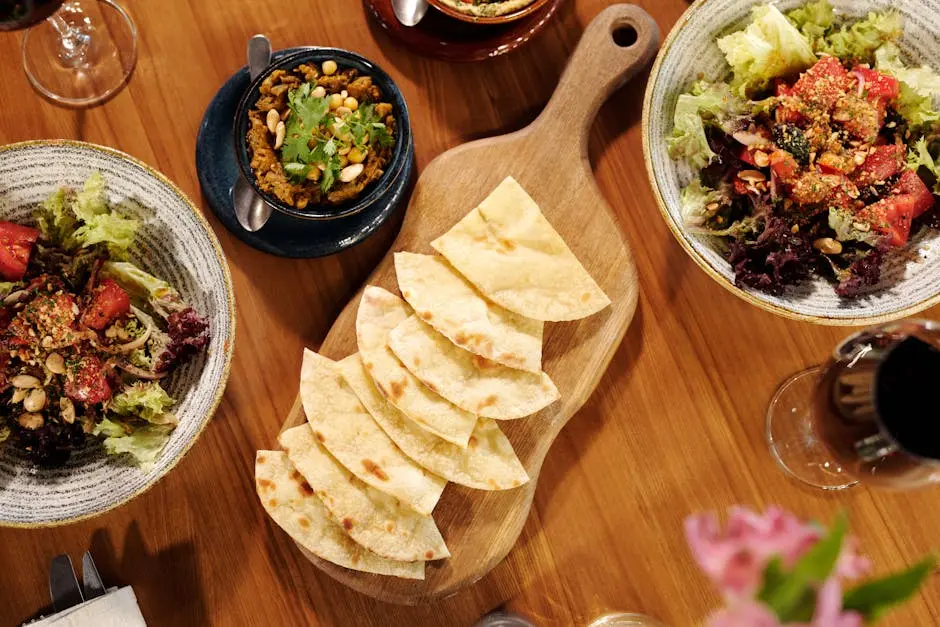Welcome to a flavorful journey through Greece, where every meal is a celebration of fresh ingredients, vibrant flavors, and rich traditions. In this blog, we’ll explore the delicious world of Greek cuisine, known for its variety and depth, promising a delightful experience for food lovers.
The Legacy of Greek Cuisine: A Historical Perspective
Greek cuisine is deeply rooted in history, offering a taste of the past that has been preserved through generations. With influences from ancient Rome, Turkey, and the Middle East, understanding this legacy provides a richer appreciation for every dish.
When we delve into the timeline of Greek food, it’s fascinating to see how many of today’s dishes can trace their origins back to antiquity. The aroma of freshly baked bread, similar to what would have graced the tables of ancient Greeks, the use of honey for sweetening desserts, and the methods of fermentation for making traditional Greek yogurt all echo history. These culinary echoes remind us of a civilization known for its profound contributions to culture, philosophy, and the arts, and where food was both sustenance and a manner of expressing hospitality.
The ancient Greeks had a saying, ‘Everything good comes from the sea,’ and this reflects the significant role of seafood in the traditional diet, largely due to Greece’s extensive coastline. Fishermen would return with the fresh catch of the day, from which regional specialties would be created, perpetuating a reliance on local produce — a practice that defines Greek cooking today. Perhaps nowhere is the historical significance of Greek cuisine more evident than in Sardines and Anchovies, staples of the Greek diet that also highlight the simplistic yet profound flavors that Greek culinary tradition encapsulates.
Staple Ingredients That Define Greek Dishes
At the heart of Greek cooking is the emphasis on fresh, local ingredients like olives, olive oil, citrus, herbs, and a variety of vegetables. These staples are the foundation of the delicious and healthy Mediterranean diet.
One cannot discuss Greek cuisine without mentioning the revered olive and its byproduct, olive oil. Greece is one of the top producers of olives globally, and the oil derived from these olives is integral to every dish, enhancing flavors and adding a touch of traditional authenticity that has been enjoyed for centuries. The olive is more than a staple; it is a symbol of peace and prosperity, deeply woven into the Greek culture and economy. The Mediterranean diet, often lauded for its health benefits, relies heavily on olive oil, which is rich in monounsaturated fats and antioxidants Mediterranean Diet Health Benefits.
Wine, when paired with Greek specialties, enhances the flavors and turns meals into unforgettable experiences. Herbs like oregano, basil, mint, and dill also play a iconic roles in Greek gastronomy, gifting dishes such as Greek salads and lamb roasts their distinct fragrances and tastes. Each herb carries its own health benefits, linking the kitchen to wellbeing in ways that resonate with the essence of Hippocrates, who once said, ‘Let food be thy medicine and medicine be thy food.’
Must-Try Dishes: A Greek Culinary Bucket List
No exploration of Greek cuisine would be complete without trying some iconic dishes: moussaka, souvlaki, baklava, and the lesser-known gemista. Each offers a unique taste experience and embodies the essence of Greek cooking.
Moussaka is often the poster child of Greek culinary creativity. It’s a sumptuous layered dish that harmoniously blends the sweetness of eggplants with the richness of minced meat, topped with a creamy béchamel sauce. This baked masterpiece embodies the essence of comfort food, giving a nod to both Greek and Arab influences. Every bite tells a story of cultural exchanges and culinary innovations that have passed through Greece over centuries.
And then there’s souvlaki, a quick snack or a full meal, satisfying cravings with its marinated meat, typically grilled on a skewer. It’s usually served with pita, onions, tomatoes, and the quintessentially Greek Tzatziki sauce, which offers a refreshing tang from yogurt mixed with cucumbers and garlic. This simple yet flavorful dish exemplifies the Greek mastery of grilling techniques Greek Grilling Techniques.
Baklava, that heavenly sweet treat of phyllo pastry, nuts, and honey, offers a deliciously sticky experience that roots back to Byzantine times, showcasing the confluence of Greek and Middle Eastern culinary traditions. For a truly local experience, try gemista – vegetables stuffed with rice and herbs, evoking the fresh and healthy essence of Greek cooking, these stuffed delights can vary with minced meat, providing a comforting and nutritious option that announces the richness of seasonal produce. Each of these dishes is a must-try for anyone looking to experience Greece on a plate.
Traditional Greek Dining: More than Just a Meal
Dining in Greece is a social affair, involving family and friends gathered around the table. It’s not just about the food but also the communal experience, sharing stories, laughter, and love.
In Greek culture, meals are a celebration of life, family, and community. The tradition of Mezedes — small, flavorful dishes meant to be shared — captures the essence of social dining, where the focus is as much on the time spent together as it is on the food itself. This collection of small plates fuels conversation and camaraderie, allowing diners to savor a variety of textures and tastes over a leisurely extended period.
Family and festivity are at the heart of Greek dining, often involving multiple generations gathering together to indulge in a plethora of homemade dishes. A typical Greek dinner could last for hours, filled with laughter, storytelling, and music, as everyone enjoys the feast. Greeks say ‘Kalí órexi’ — good appetite — before meals, not just as a nod to tradition, but as an invitation to partake in a shared experience.
The Role of Greek Wine and Spirits
Complementing the food are Greek wines and spirits like Retsina, Ouzo, and Metaxa. These beverages hold a special place in the dining experience, enhancing flavors and contributing to the convivial atmosphere.
Greek wine has been around for thousands of years, with the region’s unique climate and soil producing varieties that are now celebrated across the world. Retsina, known for its distinct pine resin flavor, offers a sip into tradition that dates back to ancient times. The resin was originally used to preserve the wine, but today, it provides a unique taste that’s paired beautifully with local dishes.
Similarly, no trip to Greece is complete without a taste of Ouzo, an anise-flavored aperitif that embodies the spirit of Greek joie de vivre. Distilled in many parts of Greece, each region’s variation of Ouzo is slightly different, offering a diversity of aromas and flavors. It’s traditionally diluted with water and served with mezedes, fostering a culture of relaxation and good cheer.
Then there’s Metaxa, a brandy-like spirit that often serves as the perfect conclusion to a meal. Its complex flavor, aged in barrels and mixed with muscat wines and botanicals, symbolizes the sophistication of Greek spirits and their gradual evolution through experimentation. These drinks aren’t merely accompaniments; they are integral to the gastronomic culture of Greece, lifting every meal from sustenance to celebration.
Conclusion: A Culinary Journey Worth Savoring
Exploring the culinary delights of Greece offers not just a taste of its exquisite flavors but also a piece of its rich cultural tapestry. From the freshness of ingredients to the time-honored traditions, Greek cuisine is a journey worth embarking on. Until next time, kalí órexi!








